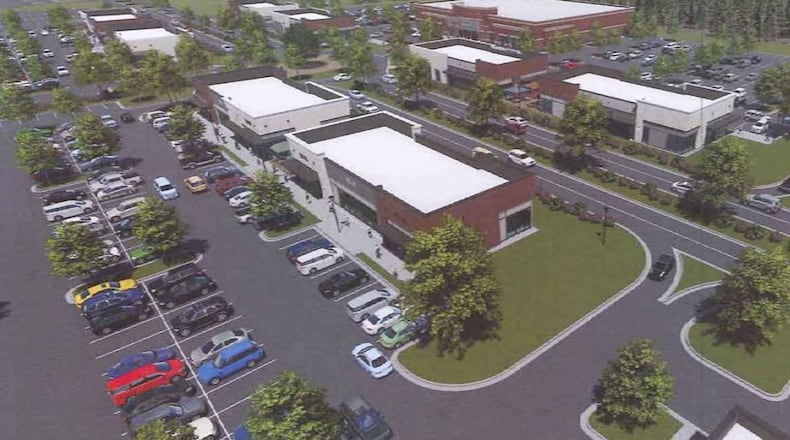Gwinnett officials are mulling the creation of a special tax district to help jumpstart a major development near the Mall of Georgia.
The Board of Commissioners is scheduled to consider the new tax allocation district, or TAD, during Tuesday night's meeting. The TAD would cover a wooded, 103-acre site at the southeastern corner of I-85 and Ga. 20, where Fuqua Development wants to build a sprawling complex that would include 1,000 apartments, a hotel and various dining, shopping and entertainment options.
A TAD’s goal is to encourage development by making more funding available sooner. It does that by freezing the assessed value of properties in the specified area and freeing developers to use would-be property tax money to help finance projects. Bonds are often involved.
The thought is that an initial sacrifice in county property tax revenue is worth it — as long as it enables projects that would not otherwise be built and, eventually, gives county coffers a much larger boost.
The Gwinnett County Redevelopment Agency quietly approved the Exchange at Gwinnett TAD proposal late last month, sending it to the Board of Commissioners for a final vote.
District 1 Commissioner Jace Brooks is not sold on the idea.
“Based on what I know right now, I’m not comfortable with it,” Brooks told The AJC on Monday. “But I need to hear the presentation and comments (Tuesday) before making a decision.”
Fuqua Development principal Jeff Fuqua did not immediately respond to a request for comment.
If approved, the Exchange at Gwinnett TAD would freeze the taxable value of the site at its current level of around $2.9 million for as long as 20 years.
At least two different financing strategies have been presented for consideration by the commission, but between $30 million and $40 million in TAD funding could be created after the development is built.
That money would enable Fuqua to “overcome deficient infrastructure, defray significant on-site earth moving and site preparation costs, and construct the substantial utility and transportation infrastructure necessary to support a development of this magnitude,” according to documents drafted by Fuqua and county staff.
The cost associated with those barriers has previously made development in the area untenable, the documents said.
Upon completion, the taxable assessed value of the Exchange at Gwinnett would be more than $137 million, officials estimated.
“This would result in approximately $5.6 million in new real estate and personal property tax receipts when The Exchange is fully built-out,” documents said.
Gwinnett currently has five TADs, all approved in 2009 and all in developmentally challenged areas like Gwinnett Place, Jimmy Carter Boulevard and the U.S. 78 corridor.
Joe Allen, director of the Gwinnett Place Community Improvement District, said he’s not sure the Mall of Georgia area fits that mold.
Allen was the lone member of the Gwinnett County Redevelopment Agency to vote against the TAD proposal, balking at the area near Buford being described as deteriorating and under-developed. He said approving a TAD in an area where there’s not a real need would set a bad precedent.
“I’m thinking, ‘Are we describing the same Mall of Georgia area that I know?’” Allen said. “I just in good conscience could not vote for that.”
Fuqua Development is known for building large-scale projects across the metro area, including The Battery Atlanta around SunTrust Park in Cobb County. In Gwinnett, Fuqua was behind the city of Peachtree Corners' recently opened new town center.
The Board of Commissioners approved the rezoning necessary for the Exchange at Gwinnett more than a year ago. The project is proposed to include 1.6 million square feet of offerings, including a 20-kitchen food hall, a dine-in movie theater, a Top Golf location and office space.
Fuqua announced last month the planned addition of Andretti Indoor Karting and Games.
Construction could be completed by mid-2021, officials have said.
Gwinnett Commission Chairman Charlotte Nash said she supports the TAD. She said the “quality and value of the development would not match our expectation” without assistance and said things like sales tax revenues would flow from the development even during the life of the TAD.
“These revenues coupled with the jobs created by the project and the substantial increase in property tax revenues from this site that would be available in the future convinced me that the use of the TAD mechanism was in our best interests,” Nash said.
About the Author
Keep Reading
The Latest
Featured



